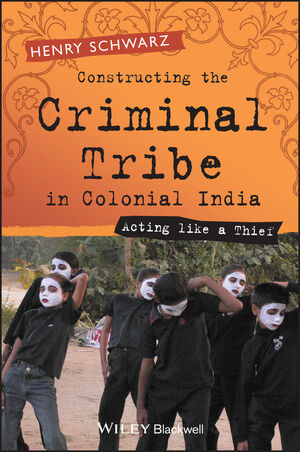
Constructing the Criminal Tribe in Colonial India: Acting Like a Thief
ISBN: 978-1-4051-2057-9
Hardcover
176 pages
April 2010, Wiley-Blackwell
US $110.95ADD TO CARTThis price is valid for India. Change location to view local pricing and availability.
|
Constructing the Criminal Tribe in Colonial India provides a detailed overview of the phenomenon of the
“criminal tribe” in India from the early days of colonial rule to the present.
- Traces and analyzes historical debates in historiography, anthropology and criminology
- Argues that crime in the colonial context is used as much to control subject populations as to define morally repugnant behavior
- Explores how crime evolved as the foil of political legitimacy under military
- Examines the popular movement that has arisen to reverse the discrimination against the millions of people laboring under the stigma of criminal inheritance, producing a radical culture that contests stereotypes to reclaim their humanity
Table of Contents
Acknowledgments.Introduction.
1. Placing Criminals, Displacing Thuggee: Historical Representation, "Fact," and Stereotype, c. 1830–2005.
2. How to Make a Thug: Recipes for Producing Crime, 1830–1910.
3. Discipline, Labor, Salvation: Repression, Reform, and the Thuggee Precedent.
4. Acting Like a Thief: From Aesthetics of Survival to the Politics of Liberation.
Notes.
Bibliography.
Index.
Author Information
Henry Schwarz is Associate Professor of English at Georgetown University. He is author of Writing
Cultural History in Colonial and Postcolonial India (1997) and co-editor of Reading the Shape of the World:
Toward an International Cultural Studies (with Richard Dienst, 1996) and of A Companion to Postcolonial
Studies (with Sangeeta Ray, Blackwell, 2000).
1. Placing Criminals, Displacing Thuggee: Historical Representation, "Fact," and Stereotype, c. 1830–2005.
2. How to Make a Thug: Recipes for Producing Crime, 1830–1910.
3. Discipline, Labor, Salvation: Repression, Reform, and the Thuggee Precedent.
4. Acting Like a Thief: From Aesthetics of Survival to the Politics of Liberation.
Notes.
Bibliography.
Index.
Author Information
Henry Schwarz is Associate Professor of English at Georgetown University. He is author of Writing
Cultural History in Colonial and Postcolonial India (1997) and co-editor of Reading the Shape of the World:
Toward an International Cultural Studies (with Richard Dienst, 1996) and of A Companion to Postcolonial
Studies (with Sangeeta Ray, Blackwell, 2000).
No comments:
Post a Comment